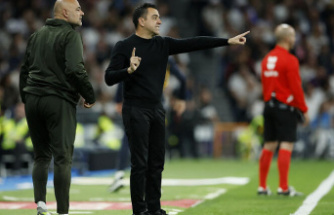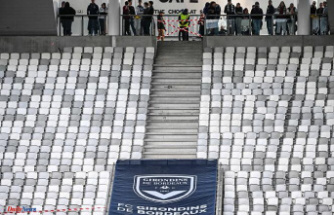Toni Kroos' interrupted interview after winning the Champions League is discussed almost more in Germany than the game itself. Most of the social media agree with the footballer, work on ZDF reporter Nils Kaben. He does his job the way it should be.
How is it that Real Madrid won the Champions League? If coach Carlo Ancelotti's team hadn't had an outstanding goalkeeper Thibaut Courtois in goal, who had caught an unearthly day, it would probably have been nothing. 24 to 4 shots on goal for Liverpool alone speak for themselves. This final, it was dominated by Jurgen Klopp's team, but it was won by Real Madrid. That defies all logic - and that can, no must, be discussed.
As is well known, Toni Kroos saw things differently when ZDF reporter Nils Kaben asked why. "Was it surprising to you that Real Madrid got into a lot of trouble?" Was his question in the field interview, which the now five-time Champions League winner dismissed flippantly: "You had 90 minutes to ask yourself reasonable questions think about it, honestly. And then you ask me two fucking questions. Crazy." The 32-year-old didn't even listen to Kaben's explanatory question that Real had almost been eliminated twice in the group phase, turned away and broke off the interview. It shows the footballer's strange understanding of journalism - which seems to be widespread in society.
Because on social media, most of the former national players jumped in and scolded the bad, oh what, incompetent journalists. Yet he did his job. To ask what is, to demand explanations and not to be the footballer's court reporter. Adulation and preparing a stage for the good mood sentimentality, well and good, Kaben had already dealt with that before when Kroos was allowed to speak about the special evening that his whole family was there at the stadium. Unlike some colleagues, who see their job as over, the ZDF journalist had more to offer. Just clarifying a legitimate question. Whether he could have been a bit more sensitive when digging deeper is a matter of opinion.
But this critical digging is what distinguishes said court reporting from real journalism. The moment when it comes to content, uncolored at that, where press officers don't have the chance to iron everything out and to moderate every point of attack in advance in an unassailable manner. If you just want to be in a good mood, you'll leave it at adulation. Just like after the ZDF interview, when Kroos was still upset in the off that one could have seen from the negatively colored questions alone that "you come from Germany" and then had the interview with DAZN. There he was allowed to let his emotions run free - and was permanently referred to as Sir Toni Kroos. That's probably what Kroos expected.
But Kaben was about more, he wanted to get into the analysis of the game, what Kroos' Madrid had offered 90 minutes earlier to win the title. That is worth discussing. But the format of the field interview is a difficult one. Anyone who has just completed a game is knocked out, adrenaline-charged, either euphoric or severely disappointed. That also ended at the 2014 World Cup with Per Mertesacker in the now famous ice barrel interview. There is hardly a thought for concise analysis so shortly after the game. With his flippant manner, Thomas Müller has burned himself in, but usually the content of such an interview is not so great that it is remembered for a long time. There is not enough time and space on the soccer field for journalistic distance, which is a matter of course in other departments such as politics and business.
It is also a problem of sports journalism that critical distance is not expected enough. In a profession in which sometimes a club member still writes the match report for the local newspaper. In which clubs have discovered great power for themselves and use it with their own media. Many fans see it as real journalism and put it on a par with the work of the media, then criticize the press representative that "XY" TV had announced the change of this and that player earlier. Questions like Kaben's are not to be expected, as you don't want to offend your own players.
Of course, sport thrives on emotions and they have to be conveyed. But it is also about asking critical questions, about clarifying legitimate questions. Kaben's was one of those. She doesn't have to please Kroos. But he doesn't have to just let it go because of that.












